1.Big Numbers Coming for Deficit…View In Relation to GDP.
Barrons
March 18: Just how big could fiscal stimulus get? During the Great Recession, the federal budget deficit peaked around 10% of gross domestic product. Were the federal government to run a similar deficit this year, it would amount to about $2.2 trillion.
But even this 10% figure probably does not represent the true upper bound on federal borrowing. During World War II, the federal budget deficit peaked at nearly 30% of GDP in 1943, and was more than 20% each year in the 1943-45 period.
A federal budget deficit of 30% of GDP today would amount to nearly $7 trillion. Of course, financing these deficits required extraordinary efforts, such as sizable war-bond programs and direct coordination between the Treasury and the Federal Reserve. While we doubt the fiscal response will be anything quite that big, the federal government possesses significant fiscal ammunition, particularly when real interest rates on Treasury securities remain negative.—Michael Pugliese
https://www.barrons.com/articles/wall-street-views-on-the-virus-the-economy-and-the-markets-51584748842?mod=past_editions
We were at recession level deficits before recession.
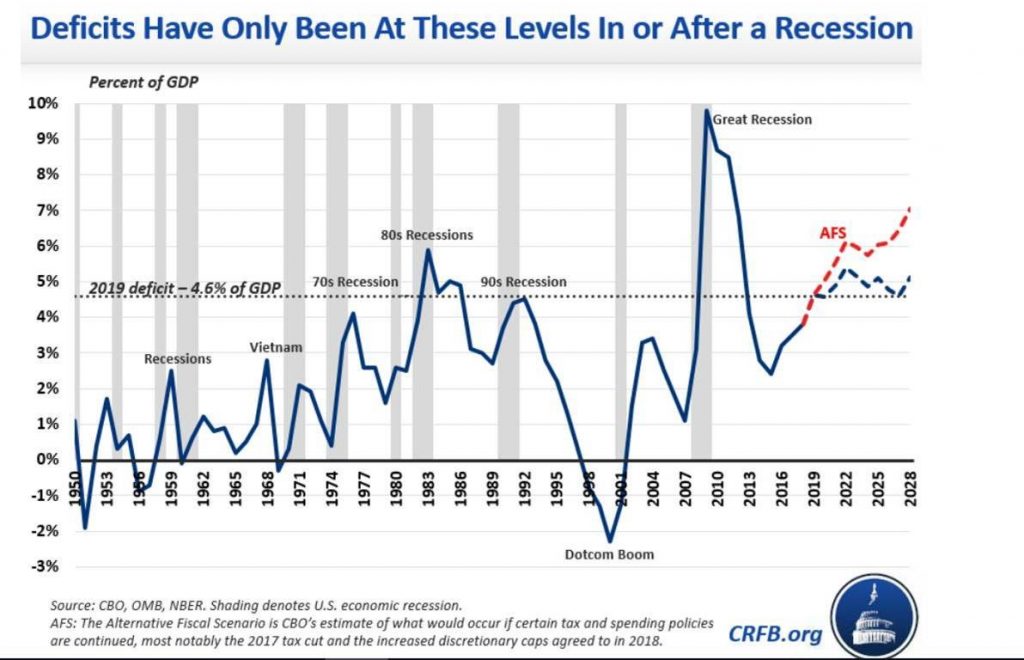
http://www.crfb.org/blogs/deficit-has-never-been-high-when-economy-was-strong
2.Stock Buybacks Were Massive Part of this Bull …
Look for buybacks to come under massive scrutiny in any bailout….What companies will have cash to do buybacks now?

https://twitter.com/search?q=gundlach&src=typed_query
PKW BUYBACK ETF—Blue Support Line Goes Back to 2008 Crisis.

www.stockcharts.com
3.The Entire Airline Industry is Worth Less Than Disney Stock Today.
JETS Airline ETF -60% vs. Disney -40%
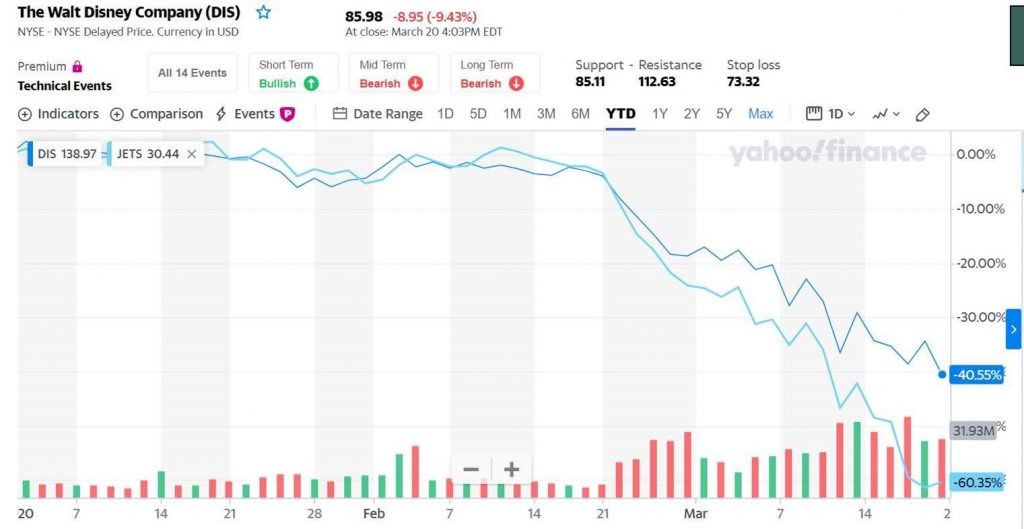
www.yahoofinance.com
4.High-Yield Corporate Bond Spreads Widen….Speculation of 10% Default Rates in High Yield.
Guggenheim
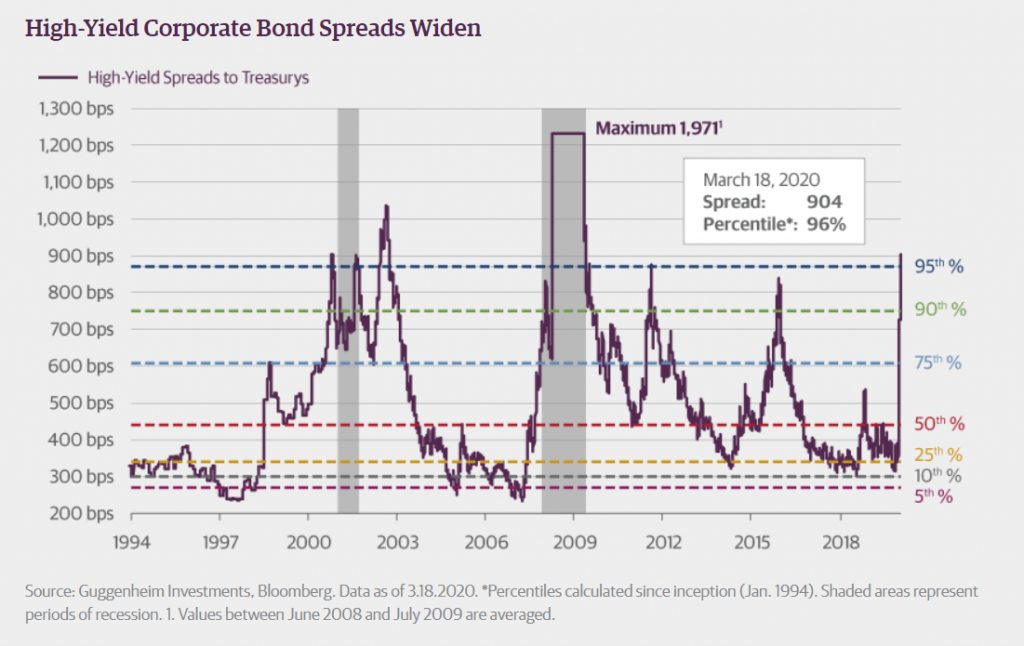
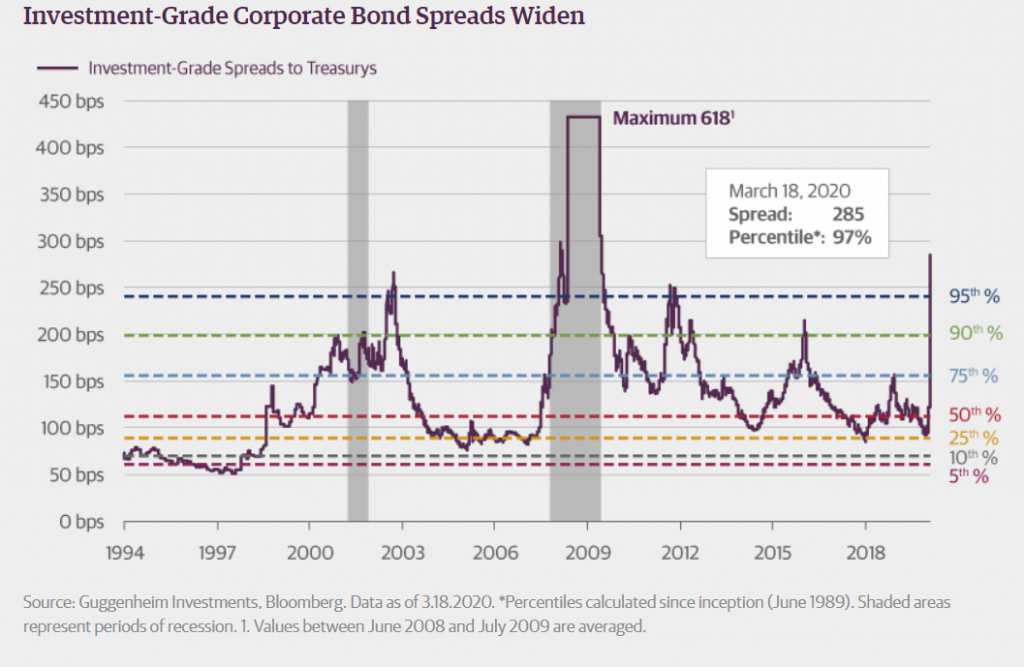
5.Goldman and Citi Drop Below Tangible Book Value.
Tangible book is a conservative measure of shareholder equity that excludes goodwill and other intangibles and has often proved to be a floor under bank stocks.
Goldman Sachs
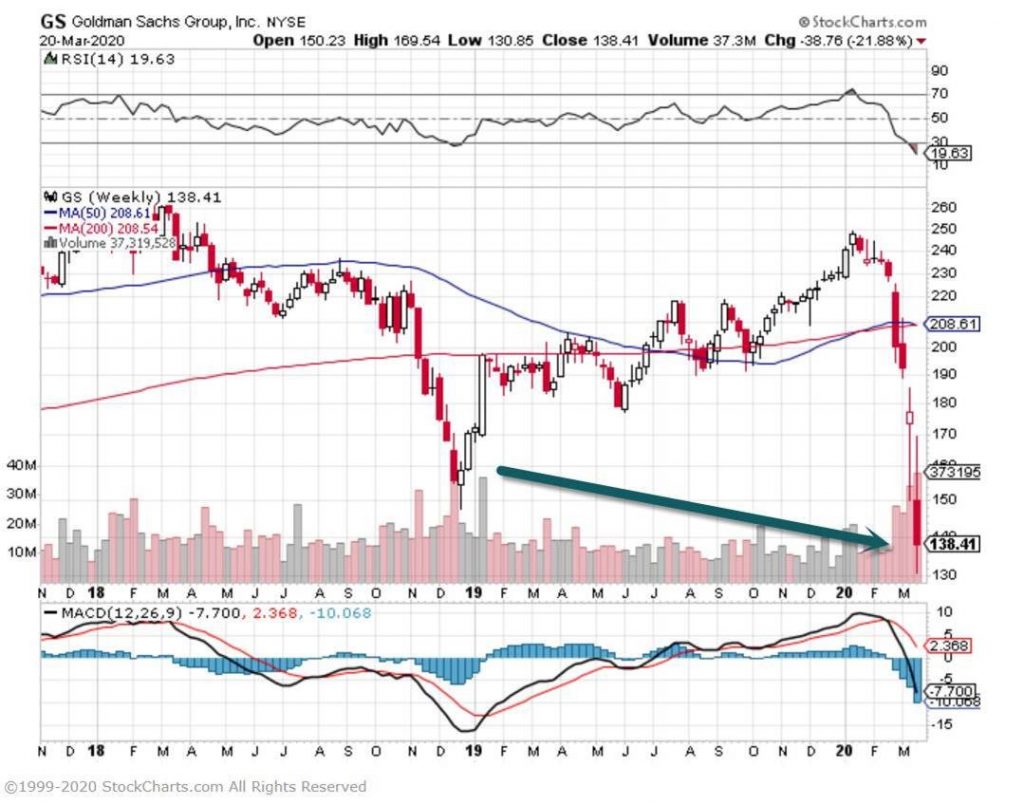
Citigroup
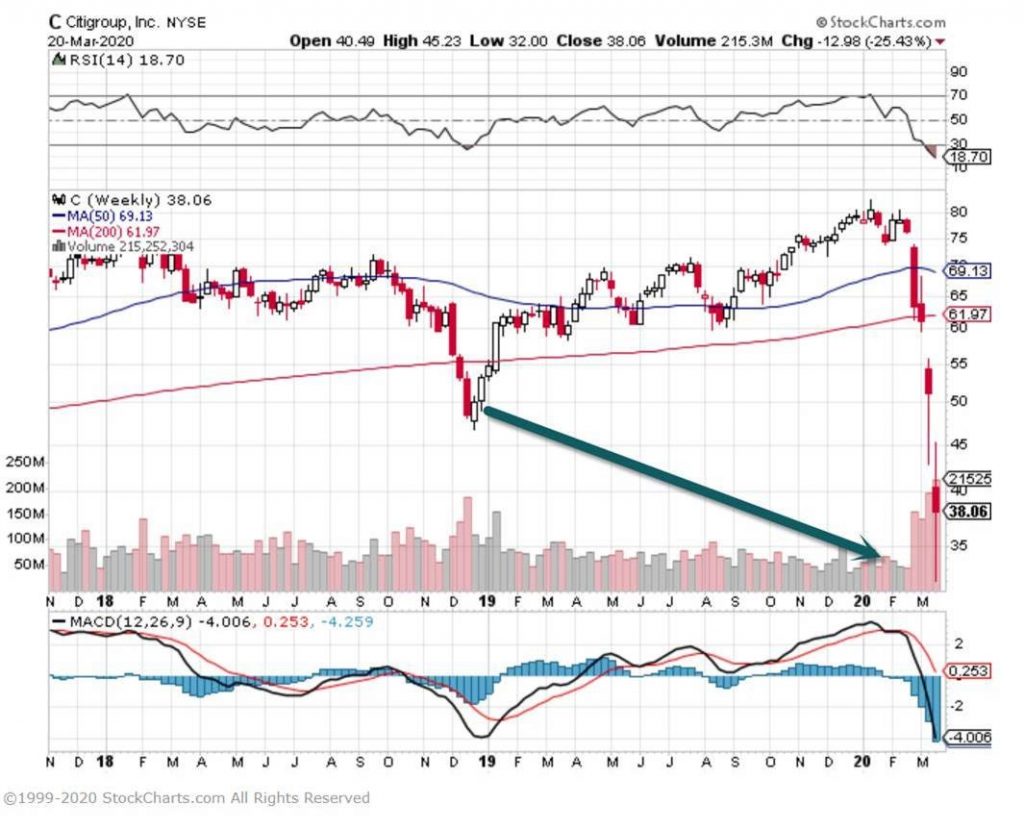
www.stockcharts.com
BARRONS–Big Banks Are Facing Their First Major Test Since the Financial Crisis-By \Andrew Bary
https://www.barrons.com/articles/big-banks-have-their-real-life-stress-test-why-they-will-persevere-51584743591?mod=past_editions
6.S&P Companies With Highest Debt Loads.

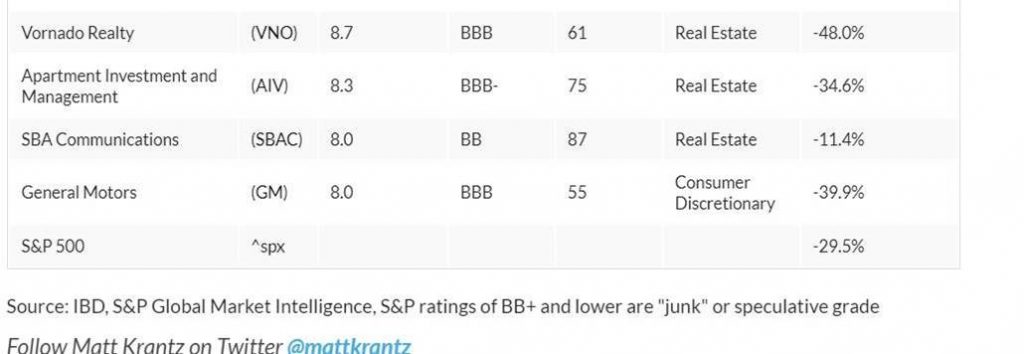
7.Where Will Prices at the Gas Pump Bottom?
Unleaded Gas Dive.
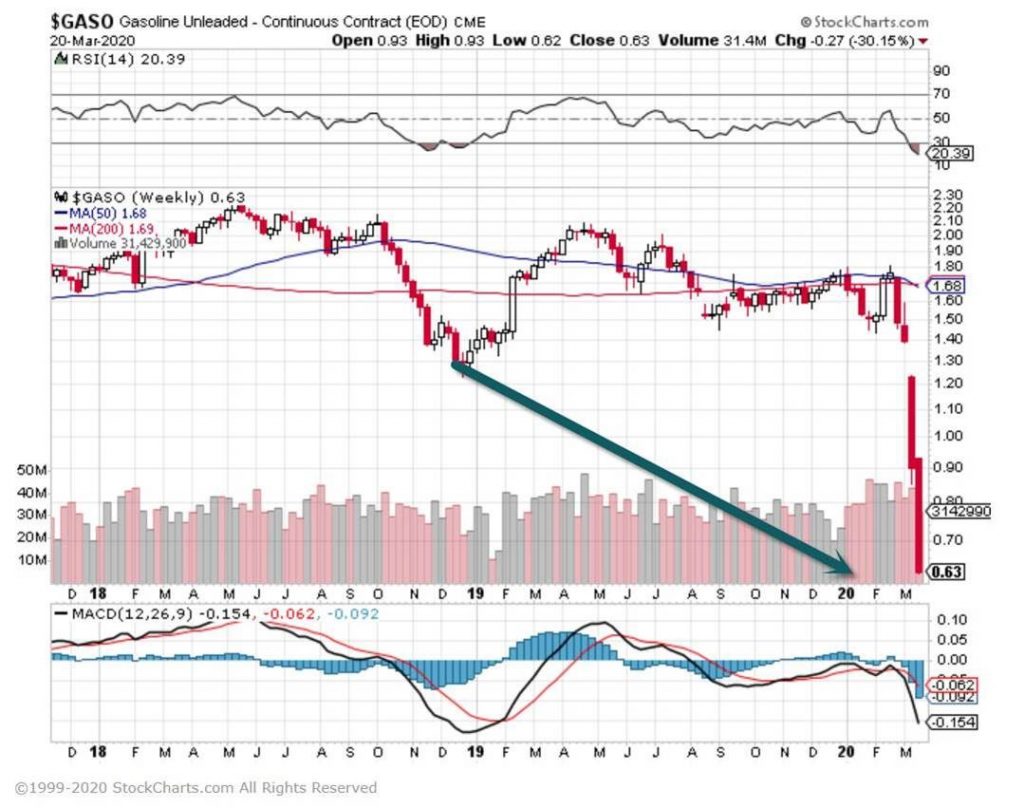
www.stockcharts.com
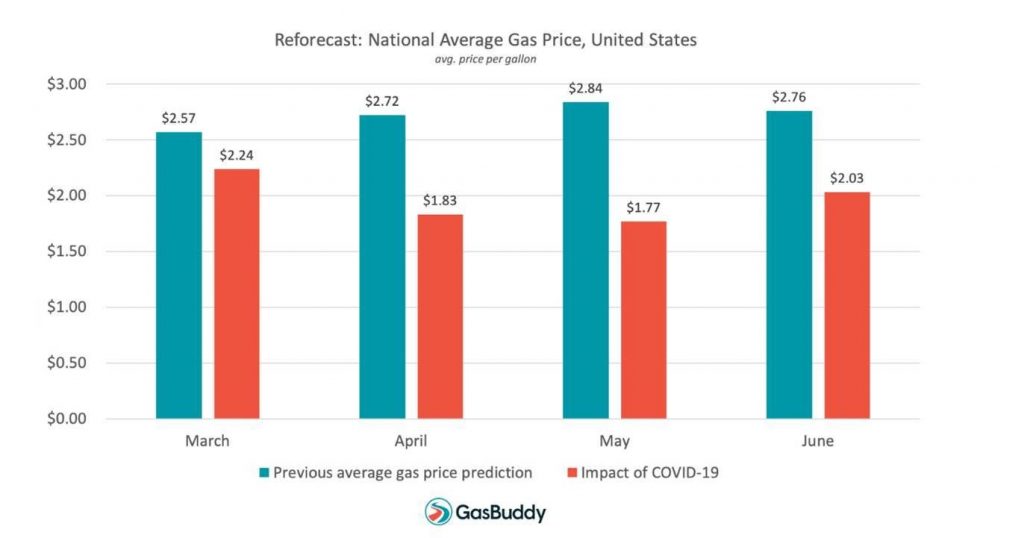
8.Small and Medium Size Business 83% of Employment.

The US economy mainly consists of small businesses, see chart below, and this is a challenge in a situation where policymakers want to quickly get money into the hands of the corporate sector either via fiscal policy or monetary policy.
Let us know if you would like to add a colleague to this distribution list.
Torsten Sløk, Ph.D.
Chief Economist

9.Treasury Yields Move Higher…Dollar Spikes 8% in 2 Weeks.
Tons of volatility in bond markets for you to read about. Every crisis in history saw 10 year yields move higher before we bottomed except 2008. Above my pay grade so follow up with some reading.
10-Year Treasury Yield

www.stockcharts.com
Dollar Spikes 8% in 2 weeks…Sell everything rally

10.5 Ways Reading Makes You a Better Leader
MICHAEL HYATT
The Science Behind Reading and Influence Pollsters say reading is in decline. As an author and former publishing executive, the statistics make me wince. But I’m optimistic for another reason.
Why? A readership crisis is really a leadership crisis. And for people who know how to respond, crisis is just another way of saying opportunity.
I’ve been a serious reader for decades: business and personal development, history, the Bible, current events, theology, philosophy, and even some fiction. I’m a content glutton. It’s part of who I am. And it’s also enabled me to become the leader I am.
I’m not alone. I know very few leaders who are uninterested in reading. And some CEOs are famous for their libraries and wide-ranging interests. Steve Jobs was, for one example, obsessed with the poet William Blake.
Readers are likely to be leaders. And with reading in decline, readers possess a comparative advantage in today’s business and political environments. How?
Here are five ways reading can uniquely develop and empower leaders:
- Reading Makes us Better Thinkers
Reading is one of the most efficient ways to acquire information, and leaders need a lot of general information to keep perspective and seize opportunities. But reading does more than give us a toolbox of ideas. It actually upgrades our analytical tools, especially our judgment and problem-solving abilities.
Research by Anne E. Cunningham compared the general knowledge of readers and television watchers. The readers not only knew more, but they were also better at deciphering misinformation. In other words, reading improved their judgment.
Correctly sizing up a situation—often with incomplete information and limited time—is critical for being an effective leader. I have strong natural intuition, but I’m convinced that my reading has sharpened my edge when it comes to judgment.
These improved analytic tools also help us see patterns and make connections between seemingly random information. We’re not only improving our judgment, we’re also boosting our problem-solving abilities.
I’m always surprised when I’m working on an issue and some out-of-left-field analogy comes to mind from something I’ve read that helps me put all the pieces together. Wesley Hill even recommends what he calls “irrelevant reading,” going outside your field to spark new thoughts and make fresh connections. - Reading Improves Our People Skills
Sometimes we think of readers as antisocial introverts with the their nose in a book and ignoring the people around them. But reading can can actually improve a leader’s people skills.
Stories give us an opportunity to walk in other people’s shoes and see the world through their experiences and with their motivations—this is especially true for novels, biographies, and memoirs. When asked about the reading that helps her lead her business, one CEO said the insights about human nature in fiction and poetry has made all the difference in understanding and relating to her people.
And the physical act of reading is actually what makes these lessons stick. Brain scans show that as we relate to characters in stories we make neural connections that linger days after we put the book down on the nightstand.
What this tell us is that the experience of reading has the potential to help us boost our emotional IQ and better identify with people. And empathy is a vital leadership skill for creating alignment, understanding motivation, setting organizational goals, and more. - Reading Helps us Master Communication
When we read, especially widely and deeply, we pick up language proficiency that transfers across the board, including speaking and writing.
Reading uniquely expands our vocabulary. According to Cunningham, the books, magazines, and other written texts we read as adults use double and triple the number of rare words we hear on television.
This is important for leaders because an expanded vocabulary means not only greater precision in our communication, but with the improvement in emotional IQ we discussed in Way 2, we’ll also be able to choose words that are more persuasive and motivate the kind of behaviors we want.
We can leverage this across all of our communication. I can personally attest to the fact that this kind of skill transfers to both writing and public speaking. I’ve been doing both for years now, and can’t imagine succeeding without the mastery of language I’ve learned through books and other reading. - Reading Helps us Relax
An ongoing challenge every leader faces is managing stress. The great news is that while we’re reading and picking up the benefits of Ways 1, 2, and 3, we can simultaneously lower our stress levels.
One study compared reading to other stress relievers like walking, listening to music, or drinking a cup of tea. Reading was found the most effective, and it worked to lower heart rates and relieve tension in as few as six minutes.
“It really doesn’t matter what book you read,” according to the doctor who conducted the study. “By losing yourself in a thoroughly engrossing book you can escape from the worries and stresses of the everyday world.”
But it’s more than escape. Reading is “an active engaging of the imagination as the words on the printed page stimulate your creativity and cause you to enter what is essentially an altered state of consciousness.”
This is especially helpful before sleep and why reading something light is part of my nighttime ritual. - Reading Keeps us Young
I recently explained why older people make better entrepreneurs. They typically have advantages in experience, knowledge, and social networks.
It’s the same with leaders—and readers are especially positioned to leverage these advantages because reading has been shown in research by Keith E. Stanovich to keep us mentally sharp as we age. By exercising our brains with books and other reading we might even be able to prevent dementia in later years.
There are a lot of things we can do to position ourselves in the marketplace. Reading is probably not the first thing many will think of, but it’s one of the best in my experience.
In fact, I cannot think of any other single activity that can produce this list of positive effects. And given the decades-long decline in reading, being a serious reader is an increasingly unique way to develop the insights and qualities essential for leadership.
If you want to lead, you simply must read. It’s one of the surest ways to develop the qualities that will make you stand out and simultaneously equip you to lead as your influence grows.
Posted on Monday, January 20, 2020
Disclosure of Material Connection: Some of the links in the post above are “affiliate links.” This means if you click on the link and purchase the item, I will receive an affiliate commission. Regardless, I only recommend products or services I use personally and believe will add value to my readers. I am disclosing this in accordance with the Federal Trade Commission’s 16 CFR, Part 255: “Guides Concerning the Use of Endorsements and Testimonials in Advertising.”